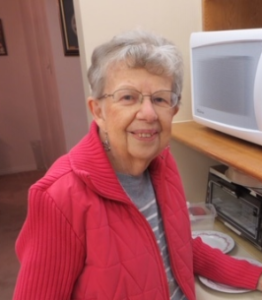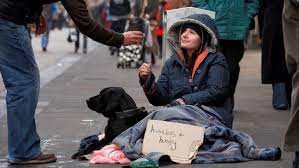[On Sunday, May 8, I was invited to preach at St. Paul’s Anglican Church in Lindsay, Ontario. It was “Shepherd Sunday” with the 23rd Psalm as a central text. It was also “Mother’s Day” and I was there as a Director of A Place Called Home, a homeless shelter in our city. So in the homily I am promoting the work of our shelter while also reflecting on the themes of the “good shepherd” in relation to the struggles of life without adequate and sustainable housing.]
Good morning St. Paul’s Anglican
church community.
I am happy and honoured
to be with you this morning,
both as your preacher and representing A Place Called Home.
I know that your patron saint is not on the agenda this morning,
but let me read some lines from how St. Paul
opens his letter to the Philippians.
“I thank my God every time I remember you, constantly praying with joy
… because of your sharing in the gospel from the first day until now.” (1.3,5)

You see, from the first day until now, you,
community of St. Paul’s Anglican church,
have shared in the good news work
that is A Place Called Home.
And on behalf of the board,
I am here to say thank you.
When a vision began to emerge some 30 years ago
for an outreach to the mostly invisible homeless population of Lindsay,
you were there.
When funding ran out in the early years to pay our executive director,
you were there supporting a FaithWorks grant
that literally saved that fledgling organization.
When we have needed financial support
and volunteers to help sustain
and grow A Place Called Home, you were there.
In the last year when we applied to Faithworks
to sustain our food outreach at our remote shelter
at the Knight’s Inn, you were there.
And throughout our history,
when we have needed wise counsel
to serve on our board of directors, you were there.
For a dozen years, St. Paul’s was at the board table
in the person of the late (and seriously great) Lois Hunter.

Lois was a fierce supporter of A Place Called Home
and recorded every press clipping,
every fundraising opportunity,
and every volunteer hour that was spent at our shelter.
And now, standing in the tradition of Lois Hunter,
your own Arlene Oaks serves on our board.
St. Paul’s you’ve been there for A Place Called Home.
You’ve been there to create and sustain
a vital and life-saving outreach in our community
to some of our most vulnerable neighbours,
and I am here to say thank you.
And now, just down the road,
you have been watching our new shelter
rise from the demolition of our previous administrative building.
This new space will provide 19 private rooms,
increased privacy, and full accessibility
in an energy efficient building.
Now, I think that we all know that the City of Kawartha Lakes
is in the midst of a serious housing crisis
that impacts folks at the lower end of the income level
more than anyone else.
The waiting list for affordable and supportive housing
is now at least 10 years long in this city.
The availability of rental units – either apartments or even rooms –
is almost zero, and what few units might become available
are invariably out of the reach of folks on programs
like Ontario Works or the Ontario Disability Support Program,
or even folks working full time
at a minimum wage.
So it is no wonder that we have a steady stream of folks
turning to A Place Called Home for support.
But we know that a housing shelter
is not a sustainable way for anyone to live.
What we need in this city is housing that provides stable,
affordable, and where necessary, supportive places for people to live.
In response to this need, A Place Called Home
is also branching out beyond our crucial shelter service
to providing transitional and rooming house options
for our neighbours in need.
Our house on Glenelg Street provides supportive transitional housing
for a small community of people,
and we are renovating the two buildings
that formerly housed our shelter beds
into rooming houses where folks can have secure housing.
I like to see these developments as our organization
living up to our name.
We are “A Place Called Home,”
and that must include but also go beyond emergency shelter spaces.
Through developing two rooming houses,
together with our transitional housing option,
we are seeking to create places that folks call really call home.
Let me try to give you a sense of who might find themselves
in need for the kind of emergency support that we provide at A Place Called Home.
She may be a single mom with an infant son,
with no place to go.
He might have just been released from prison,
trying to get his life together again.
This family may have been evicted from their apartment
because unemployment left them unable to keep up the rent.
It may have been a drug addiction, mental health struggles,
a disability, a broken marriage, or just plain and simple bad luck.
Whatever the reason, folks without a roof over their heads,
or a place to call their own, have been turning
to A Place Called Home for a quarter of a century.
Our calling is to provide shelter for our vulnerable neighbours
with compassion and without stigma,
so they might be able to move forward with dignity
to more stable and affordable housing.
Today is Mother’s Day and Shepherd Sunday.
Mothers in the room.
You know how hard it is to raise a family
and to provide the kind of security that a child needs
in order to grow into a healthy adult.
And perhaps you could imagine
(if you haven’t experienced it yourself)
the anguish of being homeless with a child or two under your care.
Perhaps you have known the anxiety of wondering
where the rent payment is going to come from.
Or maybe you have a child who has experienced homelessness
– perhaps because of an addiction or a mental health crisis –
and you have been at a loss as to how to help your child.
I don’t want to get too sentimental about motherhood,
but undoubtedly mom and home are intimately related.
Being a homemaker – regardless of gender – is a high calling.
And the experience of homelessness – one’s own or of someone we love –
is devastating.
And so, in at least some sense,
we can say that care for those who lack the necessary resources of home,
is, a motherhood issue.
This came home in a poem
written for me some years ago
when I was hanging out
with street-involved youth in Toronto.
Hand-written on a piece
of scrap paper,
Toni-Anne, a homeless teenager
gave me this poem:
I’m nobody’s sweetheart.
I’m nobody’s child.
I’m like a flower growing wild.
No mommy’s kisses.
No daddy’s smiles.
Nobody wants me.
I’m nobody’s child.
Experiencing her life as
deeply motherless,
Toni-Anne was profoundly homeless.
Homelessness is a motherhood issue.
But this is also Shepherd Sunday.
This is Psalm 23 Sunday.
And what is Psalm 23 if not a prayer about the qualities of home.
Sheep are secure, safe and at home together,
only if they have a shepherd.
So what might this psalm sound like from the perspective
of someone like Toni-Anne,
without any sense of security, no safe dwelling,
no personal safety net,
and no resources to make a home in their life?
Well, since I’ve never been homeless, I can’t be sure,
but from my experience with homeless friends over the years,
maybe it would sound something like this:
I have no shepherd,
no one who looks out for me.
And if there is a God,
he has abandoned me.
I live by my wits and street smarts.
I am in constant need.
No home,
no money,
no job,
no food,
no security,
no mommy’s kisses,
no daddy’s smiles.
If I am lying down in a pasture,
it is because I have nowhere else to lay my head.

If I am by any waters, it is usually under a bridge.
My soul is fractured,
I am deeply depressed,
anger overwhelms me,
and mostly I’m just scared.
Whenever I follow someone,
the path tends to be down dark alleys,
or places that are literally dead ends.
There is no justice on this path,
and I only know the name of God as a curse.
I have been walking in dark places,
death always seem so close,
and I live in constant fear.
I am mostly alone.
If there is any security
it is from my friends who are in the same boat with me,
and the knife that I carry,
but that gives me little comfort.
I live my life constantly looking over my shoulder,
always wary of enemies and violence.
If I get food it is from handouts or the food bank.
My hair is long and often dirty
because I can’t get a shower or afford a haircut.
And sometimes I just want to have
an overflowing cup of cheap wine,
or maybe some meth or cocaine,
to dull the pain.

It seems that poverty and bad luck
have been following me
all the days of my life,
and I’ve had nowhere to dwell,
nowhere to call home
my whole life long.
Now this doesn’t quite capture the resiliency
of folks without permanent housing.
Nor does it quite get the sense of community
that can develop on the street.
But there is so much about homelessness that is the opposite of
the 23rd psalm that I think it is important to catch the contrast.
However, there are two other things that are important to say about Psalm 23.
The first is that this is a psalm on the other side of trouble.
The psalm has integrity, indeed it only rings true,
because the psalmist has come through a time of want,
a time of lack,
a time of insecurity,
a time of confusion and disorientation,
a time of fear, threat and hunger,
indeed, a time that was so dark you could almost taste death in the air …
and come out the other side.
And the second thing that I think we need
to understand about this psalm
is that it isn’t just a hymn about God the shepherd,
nor is it just a testimony about the shepherding God
in the life of the psalmist.
No, this psalm is also a call to us to be a shepherding people.
Do you remember the gospel last week? [John 21]
Peter do you love me? asked the risen Jesus on the shore.
Then feed my sheep. Tend my flock.
As followers of the Great Shepherd,
as sheep of his own flock,
we are called to a shepherding ministry ourselves.
In fact, in Matthew 25 Jesus says that it is precisely
through a life of being a shepherd,
do we demonstrate that we are sheep of his flock:
I was hungry and you gave me food.
I was thirsty and you gave me drink.
I was a stranger and you welcomed me.
I was naked and you gave me clothing.
I was sick and you took care of me.
I was in prison and you visited me.
I had no place to lay my head,
and you gave me a place called home.
Jesus recognizes his sheep
because they serve and care for those in need.
Providing secure housing for those without a roof over their heads,
is nothing less than housing Jesus.
Feeding those who have no access to food
is nothing less than feeding Jesus.
Accompanying those who are struggling and afraid
is nothing less than walking with Jesus.
You see, my friends, we are called to realize,
manifest, and help build
the world that Psalm 23 envisions,
precisely where that world,
that sense of security,
that sense of being held in love,
that sense of safety,
that sense of being at home,
is so desperately lacking.
And you, St. Paul’s Anglican Church,
have made your contribution
to creating a Psalm 23 world,
through your ministry in this city,
and not least through your support of A Place Called Home.
But the work remains to be done.
Homelessness will only become more acute
in our city in the years to come.
And so, sisters and brothers,
we need to continue to work together
to be sheep of God’s flock,
even as we are called to be shepherds
creating home for the flock.
May it be, dear friends, that together,
under the mercy of God,
with the leading of the Holy Spirit,
we might help to shape a world in which
The Lord is my Shepherd,
I know that I am loved,
that I belong.
No longer lacking a place to call home,
or enough money to make ends meet,
I have a security that allows me to be generous.
I can lie down my head in peace every night,
and take the kids to the park and the beach.
At home in myself and in my relationships,
I have found a sense of wholeness, of peace.
I still have my demons,
I still struggle with anxiety,
and I live with trauma,
and deathly memories,
but I know that I am supported,
I know that I am loved,
I know that I am not alone.

The table is set,
a good meal is prepared,
and I can eat in peace.
I am no longer tormented
by my former enemies;
some of them now
come for dinner,
others I meet at the communion table.
I feel blessed,
and some days my heart overflows with gratitude.
I’ve been tormented by poverty and pain,
but now it feels like everyday
I am chased by goodness and mercy,
I am pursued by kindness and justice.
And I am at home in the house of the Lord,
a house with many rooms,
lots of space,
all the days of my life.


